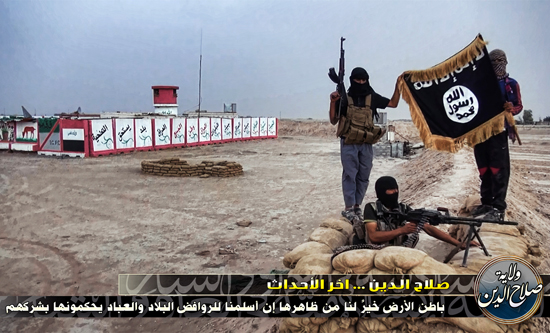
On 12 June 2014, the Iraqi air force began bombing its own people in Mosul and Tikrit. The attacks were part of a desperate attempt to stop the advance of Sunni fighters from the Islamic State of Iraq and Syria (ISIS), who had earlier captured the two cities. The following day ISIS captured two more towns in Diyala province. In the previous few days, ISIS had also attacked parts of Samara and Kirkuk, taken-over the university in Ramadi and seized the town of Baiji, the site of a major oil refinery and a power station for Baghdad. ISIS stated its intention to attack the capital.
In January 2014, ISIS occupied Fallujah and parts of Ramadi. It now controls a large area of northern and western Iraq and also parts of eastern Syria including the outskirts of Aleppo and the provincial capital of Raqqa. ISIS’s stated aim is to establish an Islamic caliphate in the region. ISIS is part of the opposition to the Assad government in Syria, though it has been disowned by other sections of the ‘rebel’ forces, including the Al Qaeda linked Al Nusra Front. ISIS is led by Abu Bakr al-Baghdadi, a former member of the Sunni anti-occupation forces and of Al Qaeda in Iraq, and is believed to be backed by ex-officers of the Iraqi army disbanded by the US after the invasion. ISIS is funded by Saudi Arabia and Kuwait.
In Mosul, Iraqi government troops, who vastly outnumbered ISIS forces, reportedly stripped off their uniforms and fled, leaving large quantities of armaments, including helicopters, planes and former US Humvees. Such a collapse of the Iraqi military will be of serious concern to US and Britain, who spent billions of dollars and many years training the Iraqi army during their occupation of the country. President Obama has threatened military action to halt the ISIS advance. The US has a $15bn arms deal with Iraq. It has accelerated the supply of small arms, missiles and ScanEagle drones and resumed supplies of Apache helicopters. F-16 fighters will be delivered by the end of the year. The US has also resumed the training of Iraqi special forces in Jordan and CIA officers are believed to be supporting the Iraqi army. If necessary, the US will launch drone and air attacks from bases outside Iraq.
Any such intervention will only exacerbate the hostility of the Sunni population. It is the imperialist invasion and occupation of Iraq and their attempt at regime change in Syria that has brought about this situation. Following the invasion, the imperialists disbanded the Iraqi army and imposed an indiscriminate ban on all former Ba’ath Party members from holding any form of government employment – the main source of jobs. They manipulated sectarian divisions in order to divide opposition to their occupation, first by supporting Shia death squads and later by enrolling exhausted Sunni fighters into the so-called Awakening Movement to oppose the Al Qaeda group that had by then been formed. (Despite US and British lies, there had been no Al Qaeda presence in Iraq before the invasion). The imperialists then launched an onslaught against the Mehdi Army, the main Shia opposition to the occupation.
It was the US ambassador who first identified Nouri Al Maliki, the Iraqi prime minister currently seeking a third term in office, as ‘our man’. Al Maliki has led a vehemently sectarian, predominantly Shia government. He has personally seized control of several key government departments; attacked and forced into exile leading Sunni politicians and tortured and imprisoned without trial thousands of Sunni activists. In May 2013, Al Maliki ordered the army to attack a Sunni peace camp in Hawaijah, killing more than 50 protestors. This was the last straw for many Sunnis seeking peaceful reform. Even in the recent elections, Al Maliki posed as a Shia leader who would quell the Sunni opposition rather than a prime minister for all the people.
With mind-boggling hypocrisy, whilst quick to impose sanctions or support military intervention in their own interests against any regime they consider undemocratic or guilty of anti-humanitarian actions, the US and Britain continue to support Al Maliki, who has taken-on dictatorial powers and is attacking his own people. In Syria, imperialist support for the anti-Assad opposition has certainly aided the rise of ISIS. In order to limit their influence, the imperialists are now faced with the prospect of supporting anti-ISIS groups which include Al Qaeda affiliates.
In Iraq, around half a million refugees are reported fleeing the fighting around Mosul. The UN reports that almost 9,000 people were killed in Iraq in the fighting last year and 800 were killed last month. With the escalation in fighting and air attacks, casualties are set to rise rapidly. If the Baghdad government is threatened, there is the possibility that Iran will move to support them. Turkey too may intervene. ISIS occupied Turkey’s embassy in Mosul and took hostages. Also, Turkey will not want its economic allies in the Kurdish region threatened. Kurdish forces have now moved into Kirkuk in an oil-rich region that has long been a source of dispute between the Kurds and both the local Sunnis and the Iraqi government. Although only a few thousand strong, ISIS has a lot of support in the Sunni areas it has captured and has been able to free potential fighters from local prisons. It will not be easy to dislodge them. The boundaries of the region were artificially proscribed by the imperialist dismemberment of the Ottoman Empire in the 1920s. The de facto division of Iraq and the drawing of new frontiers are beginning to look increasingly likely. Only the suffering of the Iraqi and Syrian people appears constant.
Jim Craven




